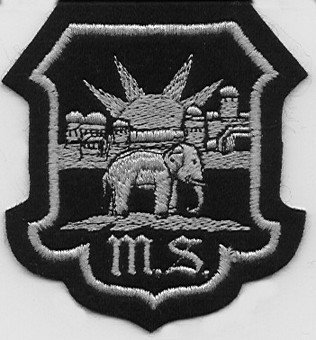History of School Rugby Milton 1910 -1970 plus annual results to 2001
60 Years of Rugby from 1970 Miltonian magazine -
Full
pdf version (4 pages)
Won 309, Drew
30, Lost 273 games (Total games 612)
ANNUAL RESULTS BY YEAR
1926 - Won 3, Lost 1
1961 - Won 7, Lost 11
1980 - Won 4, Lost 12
1927 - Won 6, Drew 1, Lost 2
1962 - Won 15, Lost 3
1981 - Won 7, Lost 6
1928 - Won 1, Lost 6
1963 - Won 16 (Unbeaten)
1982
- Won 4, Lost 12
1944 - Won 8, Lost 1
1964 - Won 4, Drew 1, Lost 9
1983 - Won 10, Lost 5
1946 - Won
1965 - Won 13, Drew 1, Lost 5
1984 - Won 8, Drew 1, Lost 1
1947 - Won 1, Drew 2, Lost 4
1966 - Won 14, Lost 2
1985 - Won 7, Drew 3, Lost 4
1948 - Won
1967 - Won 7, Drew 1, Lost 4
1986 - Won 6, Drew 1, Lost 4
1949 - Won 4, Lost 4
1968 - Won 7, Drew 1, Lost 7
1987 - Won 8, Lost 8
1950 - Won 2, Lost 5
1969 - Won 5, Lost 10
1989 - Won 4, Drew 1, Lost 5
1951 - Won 5, Drew 1, Lost 4
1970 - Won 11, Drew 2 (Unbeaten)
1988 - None available
1952 - Won 7, Lost 4
1971 - Won 8, Drew 1, Lost 4
1990 - Lost 3
1953 - Won 4, Drew 1, Lost 5
1972 - Won 2, Drew 1, Lost 10
1991 - Won 4, Drew 1, Lost 6
1954 - Won 3, Drew 1, Lost 8
1973 - Won 6, Lost 6
1993 - Won 2, Lost 10
1955 - Won 9, Drew 2, Lost 1
1974 - Won 5, Drew 2, Lost 10
2000 - Won 11, Drew 1, Lost 2
1956 - Won 10, Lost 1
1975 - Won 1, Drew 1, Lost 11
1957 - Won 6, Drew 1, Lost 3
1976 - Won 4, Lost 9
1958 - Won 8, Lost 4
1977 - Won 1, Lost 12
1959 - Won 12, Lost 4
1978 - Won 2, Lost 10
1960 - Won 10, Lost 8
1979 - Won 6, Lost 6
Detailed year matches results against all schools
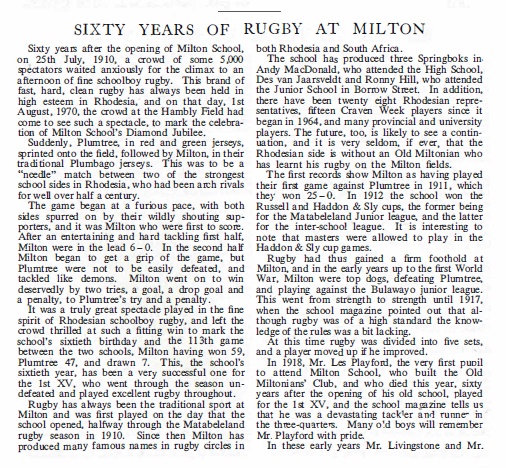
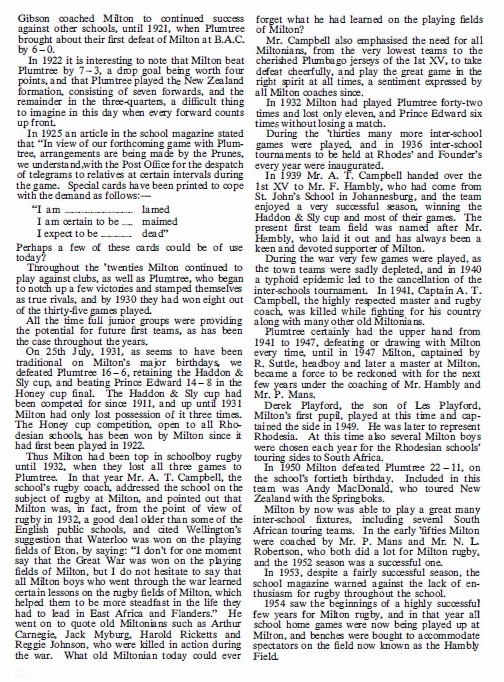
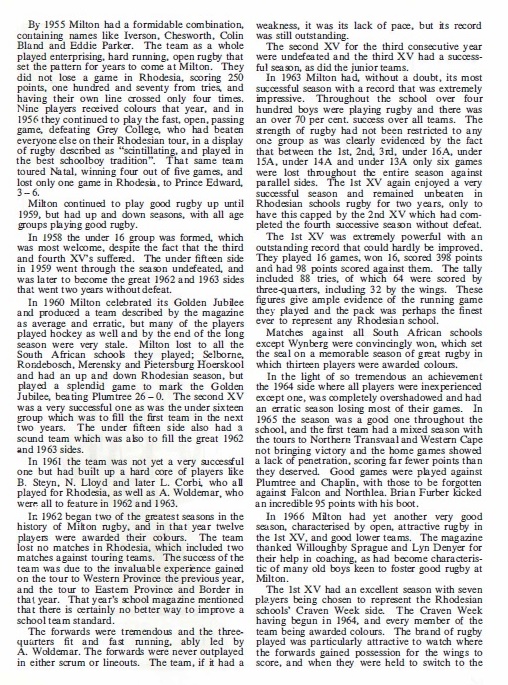
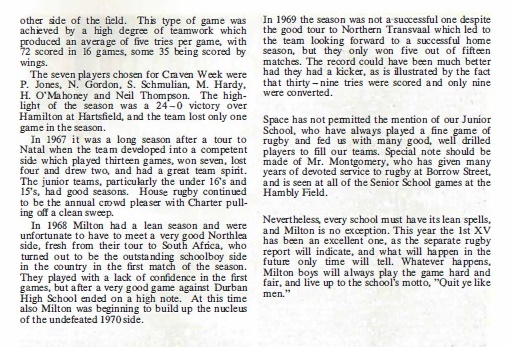
SIXTY YEARS OF RUGBY AT MILTON
Sixty years after the opening of Milton School, on 25th July, 1910, a
crowd of some 5,000
spectators waited anxiously for the climax to an afternoon of fine
schoolboy rugby. This brand of fast, hard, clean rugby has always been
held in high esteem in Rhodesia, and on that day, 1st August, 1970, the
crowd at the Hambly Field had come to see such a spectacle, to mark the
celebration of Milton School's Diamond Jubilee.
Suddenly, Plumtree, in red and green jerseys, sprinted onto the field,
followed by Milton, in their traditional Plumbago jerseys. This was to
be a "needle" match between two of the strongest school sides in
Rhodesia, who had been arch rivals for well over half a century.
The game began at a furious pace, with both sides spurred on by their
wildly shouting supporters, and it was Milton who were first to score.
After an entertaining and hard tackling first half, Milton were in the
lead 6 - 0. In the second half Milton began to get a grip of the game,
but Plumtree were not to be easily defeated, and tackled like demons.
Milton went on to win deservedly by two tries, a goal, a drop goal and a
penalty, to Plumtree's try and a penalty.
It was a truly great spectacle played in the fine spirit of Rhodesian
schoolboy rugby, and left the crowd thrilled at such a fitting win to
mark the school's sixtieth birthday and the 113th game between the two
schools, Milton having won 59, Plumtree 47, and drawn 7. This, the
school's sixtieth year, has been a very successful one for the 1st XV,
who went through the season undefeated and played excellent rugby
throughout.
Rugby has always been the traditional sport at Milton and was first
played on the day that the school opened, halfway through the
Matabeleland rugby season in 1910. Since then Milton has produced many
famous names in rugby circles in both Rhodesia and South Africa.
The school has produced three Springboks in, Andy MacDonald, who
attended the High School, Des van Jaarsveldt and Ronny Hill, who
attended the Junior School in Borrow Street. In addition, there have
been twenty eight Rhodesian representatives, fifteen Craven Week players
since it began in 1964, and many provincial and university players. The
future, too, is likely to see a continuation, and it is very seldom, if
ever, that the Rhodesian side is without an Old Miltonian who has learnt
his rugby on the Milton fields.
The first records show Milton as having played their first game against
Plumtree in 1911, which they won 25-0. In 1912 the school won the
Russell and Haddon & Sly cups, the former being for the Matabeleland
Junior league, and the latter for the inter-school league. It is
interesting to note that masters were allowed to play in the Haddon &
Sly cup games.
Rugby had thus gained a firm foothold at Milton, and in the early years
up to the first World War, Milton were top dogs, defeating Plumtree, and
playing against the Bulawayo junior league. This went from strength to
strength until 1917, when the school magazine pointed out that although
rugby was of a high standard the knowledge of the rules was a bit
lacking.
At this time rugby was divided into five sets, and a player moved up if
he improved.
In 1918, Mr. Les Playford, the very first pupil to attend Milton School,
who built the Old Miltonians' Club, and who died this year, sixty years
after the opening of his old school, played for the 1st XV, and the
school magazine tells us that he was a devastating tackler and runner in
the three-quarters. Many old boys will remember Mr. Playford with pride.
In these early years Mr. Livingstone and Mr. Gibson coached Milton to
continued success against other schools until 1921, when Plumtree
brought about their first defeat of Milton at B.A.C. by 6-0.
In 1922 it is interesting to note that Milton beat Plumtree by 7 - 3, a
drop goal being worth four points and that Plumtree played the New
Zealand formation, consisting of seven forwards, and the remainder in
the three-quarters a difficult thing to imagine in this day when every
forward counts up front.
In 1925 an article in the school magazine stated that "In view of our
forthcoming game with Plumtree, arrangements are being made by the
Prunes, we understand with the Post Office for the dispatch of telegrams
to relatives at certain intervals during the game. Special cards have
been printed to cope with the demand as follows:-
"I am ........................... lamed
I am certain to be ........ maimed
I expect to be .............. dead"
Perhaps a few of these cards could be of use today'?
Throughout the twenties Milton continued to play against clubs, as well
as Plumtree, who began to notch up a few victories and stamped
themselves as true rivals, and by 1930 they had won eight out of the
thirty-five games played.
All the time full junior groups were providing the potential for future
first teams, as has been the case throughout the years.
On 25th July, 1931 as seems to have been traditional on Milton's major
birthdays, we defeated Plumtree 16 - 6, retaining the Haddon & Sly cup,
and beating Prince Edward 14 - 8 in the Honey cup final. The Haddon & Sly
cup had been competed for since 1911, and up until 1931 Milton had only
lost possession of it three times. The Honey cup competition, open to
all Rhodesian schools, has been won by Milton since it had first been
played in 1922.
Thus Milton had been top in schoolboy rugby until 1932, when they lost
all three games to Plumtree. In that year Mr. A. T. Campbell, the
school's rugby coach, addressed the school on the subject of rugby at
Milton, and pointed out that Milton was, in fact, from the point of view
of rugby in 1932, a good deal older than some of the English public
schools, and cited Wellington's suggestion that Waterloo was won on the
playing fields of Eton, by saying: "I don't for one moment say that the
Great War was won on the playing fields of Milton, but I do not hesitate
to say that all Milton boys who went through the war learned certain
lessons on the rugby fields of Milton, which helped them to be more
steadfast in the life they had to lead in East Africa and Flanders." He
went on to quote old Miltonians such as Arthur Carnegie, Jack Myburg,
Harold Ricketts and Reggie Johnson, who were killed in action during the
war. What old Miltonian today could ever forget what he had learned on
the playing fields of Milton?
Mr. Campbell also emphasised the need for all Miltonians, from the very
lowest teams to the cherished Plumbago jerseys of the 1st XV, to take
defeat cheerfully, and play the great game in the right spirit at all
times, a sentiment expressed by all Milton coaches since.
In 1932 Milton had played Plumtree forty-two times and lost only eleven,
and Prince Edward six times without losing a match.
During the 'thirties many more inter-school games were played, and in
1936 inter-school tournaments to be held at Rhodes' and Founder's every
year were inaugurated.
In 1939 Mr. A.T. Campbell handed over the 1st XV to Mr. F. Hambly, who
had come from St. John's School in Johannesburg, and the team enjoyed a
very successful season, winning the Haddon & Sly cup and most of their
games. The present first team field was named after Mr. Hambly, who laid
it out and has always been a keen and devoted supporter of Milton.
During the war very few games were played, as the town teams were sadly
depleted, and in 1940 a typhoid epidemic led to the cancellation of the
inter-schools tournament. In 1941, Captain A.T. Campbell, the highly
respected master and rugby coach, was killed while fighting for his
country along with many other old Miltonians.
Plumtree certainly had the upper hand from 1941 to 1947, defeating or
drawing with Milton every time, until in 1947 Milton, captained by R.
Suttle, headboy and later a master at Milton, became a force to be
reckoned with for the next few years under the coaching of Mr. Hambly
and Mr. P. Mans.
Derek Playford, the son of Les Playford, Milton's first pupil, played at
this time and captained the side in 1949. He was later to represent
Rhodesia. At this time also several Milton boys were chosen each year
for the Rhodesian schools' touring sides to South Africa.
In 1950 Milton defeated Plumtree 22 - 11, on the school's fortieth
birthday. Included in this team was Andy MacDonald, who toured New
Zealand with the Springboks.
Milton by now was able to play a great many inter-school fixtures,
including several South African touring teams. In the early 'fifties
Milton were coached by Mr. P. Mans and Mr. N. L. Robertson, who both did
a lot for Milton rugby and the 1952 season was a successful one.
In 1953, despite a fairly successful season, the school magazine warned
against the lack of enthusiasm for rugby throughout the school. 1954 saw
the beginnings of a highly successful few years for Milton rugby, and in
that year all school home games were now being played up at Milton, and
benches were bought to accommodate spectators on the field now known as
the Hambly Field. By 1955 Milton had a formidable combination,
containing names like Iverson, Chesworth, Colin Bland and Eddie Parker.
The team as a whole played enterprising, hard running, open rugby that
set the pattern for years to come at Milton. They did not lose a game in
Rhodesia, scoring 250 points, one hundred and seventy from tries, and
having their own line crossed only four times. Nine players received
colours that year, and in 1956 they continued to play the fast, open,
passing game, defeating Grey College, who had beaten everyone else on
their Rhodesian tour, in a display of rugby described as "scintillating,
and played in the best schoolboy tradition". That same team toured
Natal, winning four out of five games, and lost only one game in
Rhodesia, to Prince Edward, 3 - 6.
Milton continued to play good rugby up until 1959, but had up and down
seasons, with all age groups playing good rugby.
In 1958 the under 16 group was formed, which was most welcome, despite
the fact that the third and fourth XV's suffered. The under fifteen side
in 1959 went through the season undefeated, and was later to become the
great 1962 and 1963 sides that went two years without defeat.
In 1960 Milton celebrated its Golden Jubilee and produced a team
described by the magazine as average and erratic, but many of the
players played hockey as well and by the end of the long season were
very stale. Milton lost to all the South African schools they played;
Selborne, Rondebosch, Merensky and Pietersburg Hoerskool and had an up
and down Rhodesian season, but played a splendid game to mark the Golden
Jubilee, beating Plumtree 26 - 0. The second XV was a very successful
one as was the under sixteen group which was to fill the first team in
the next two years. The under fifteen side also had a sound team which
was also to fill the great 1962 and 1963 sides.
In 1961 the team was not yet a very successful one but had built up a
hard core of players like B. Steyn, N. Lloyd and later L. Corbi, who all
played for Rhodesia, as well as A. Waldemar, who went all to feature in
1962 and 1963.
In 1962 began two of the greatest seasons in the history of Milton
rugby, and in that year twelve players were awarded their colours. The
team lost no matches in Rhodesia, which included two matches against
touring teams. The success of the team was due to the invaluable
experience gained on the tour to Western Province the previous year, and
the tour to Eastern Province and Border in that year. That year's school
magazine mentioned that there is certainly no better way to improve a
school team standard.
The forwards were tremendous and the three-quarters fit and fast
running, ably led by A. Waldemar. The forwards were never outplayed in
either scrum or lineouts. The team, if it had a weakness, it was its
lack of pace, but its record was still outstanding.
The second XV for the third consecutive year were undefeated and the
third XV had a successful season, as did the junior teams.
In 1963 Milton had, without a doubt, its most successful season with a
record that was extremely impressive. Throughout the school over four
hundred boys were playing rugby and there was an over 70 per cent
success over all teams. The strength of rugby had not been restricted to
any age group as was clearly evidenced by the fact that between the 1st,
2nd, 3rd, under 16A, under 15A, under 14A and under 13A only six games
were lost throughout the entire season against parallel sides. The 1st
XV again enjoyed a very successful season and remained unbeaten in
Rhodesian schools rugby for two years, only to have this capped by the
2nd XV which had completed the fourth successive season without defeat.
The 1st XV was extremely powerful with an outstanding record that could
hardly be improved. They played 16 games, won 16, scored 398 points and
had 98 points scored against them. The tally included 88 tries, of which
64 were scored by three-quarters, including 32 by the wings. These
figures give ample evidence of the running game they played and the pack
was perhaps the finest ever to represent any Rhodesian school.
Matches against all South African schools except Wynberg were
convincingly won, which set the seal on a memorable season of great
rugby in which thirteen players were awarded colours.
In the light of so tremendous an achievement the 1964 side where all
players were inexperienced except one, was completely overshadowed and
had an erratic season losing most of their games. In 1965 the season was
a good one throughout the school, and the first team had a mixed season
with the tours to Northern Transvaal and Western Cape not bringing
victory and the home games showed a lack of penetration, scoring far
fewer points than they deserved. Good games were played against Plumtree
and Chaplin, with those to be forgotten against Falcon and Northlea.
Brian Furber kicked an incredible 95 points with his boot.
In 1966 Milton had yet another very good season, characterised by open,
attractive rugby in the 1st XV, and good lower teams. The magazine
thanked Willoughby Sprague and Lyn Denyer for their help in coaching, as
had become characteristic of many old boys keen to foster good rugby at
Milton.
The 1st XV had an excellent season with seven players being chosen to
represent the Rhodesian schools' Craven Week side. The Craven Week
having begun in 1964, and every member of the team being awarded
colours. The brand of rugby played was particularly attractive to watch
where the forwards gained possession for the wings to score, and when
they were held to switch to the other side of the field. This type of
game was achieved by a high degree of teamwork which produced an average
of five tries per game, with 72 scored in 16 games, some 35 being scored
by wings.
The seven players chosen for Craven Week were P. Jones, N. Gordon, S.
Schmulian, M. Hardy, H. O'Mahoney and Neil Thompson. The highlight of
the season was a 24 - 0 victory over Hamilton at Hartsfield, and the team
lost only one game in the season.
In 1967 it was a long season after a tour to Natal when the team
developed into a competent side which played thirteen games, won seven,
lost four and drew two, and had a great team spirit. The junior teams,
particularly the under 16's and 15's, had good seasons. House rugby
continued to be the annual crowd pleaser with Charter pulling off a
clean sweep.
In 1968 Milton had a lean season and were unfortunate to have to meet a
very good Northlea side, fresh from their tour to South Africa, who
turned out to be the outstanding schoolboy side in the country in the
first match of the season. They played with a lack of confidence in the
first games, but after a very good game against Durban High School ended
on a high note. At this time also Milton was beginning to build up the
nucleus of the undefeated 1970 side.
In 1969 the season was not a successful one despite the good tour to
Northern Transvaal which led to the team looking forward to a successful
home season, but they only won five out of fifteen matches. The record
could have been much better had they had a kicker, as is illustrated by
the fact that thirty-nine tries were scored and only nine were
converted.
Space has not permitted the mention of our Junior School, who have
always played a fine game of rugby and fed us with many good, well
drilled players to fill our teams. Special note should be made of Mr.
Montgomery, who has given many years of devoted service to rugby at
Borrow Street, and is seen at all of the Senior School games at the
Hambly Field. Nevertheless, every school must have its lean spells, and
Milton is no exception. This year the 1st XV has been an excellent one,
as the separate rugby report will indicate, and what will happen in the
future only time will tell. Whatever happens, Milton boys will always
play the game hard and fair, and live up to the school's motto, "Quit ye
like men."
Research for magazine done by Derek Fenton
